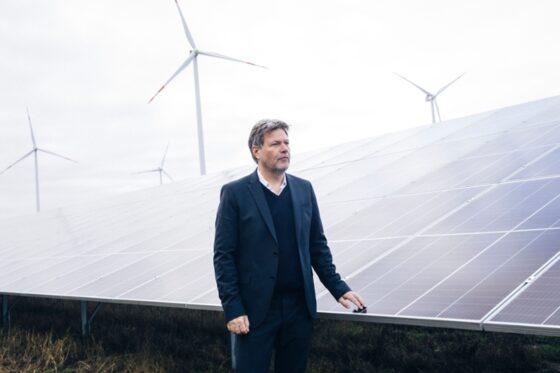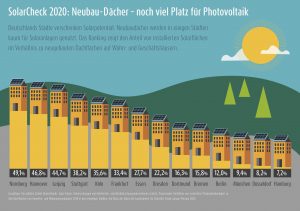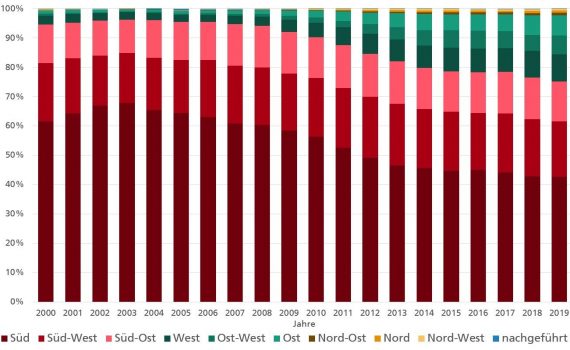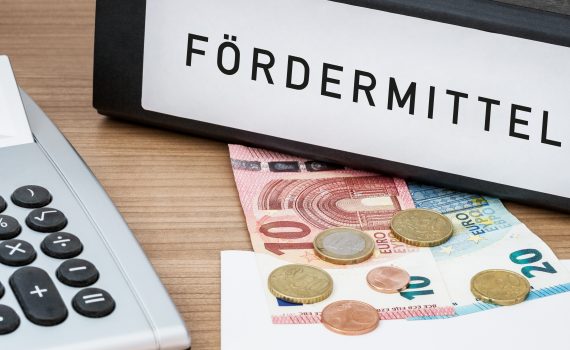Die EU-Staaten haben endgültig grünes Licht für die überarbeitete Richtlinie zur Energieeffizienz von Gebäuden gegeben und die neuen Vorgaben formell beschlossen. Kadri Simson, EU-Kommissarin für Energie, begrüßte das Votum: „Eine bessere Gesamtenergieeffizienz von Gebäuden ist von entscheidender Bedeutung, um unser Ziel der Klimaneutralität zu erreichen und die Energieunabhängigkeit Europas zu stärken. Renovierungen sind Investitionen in eine bessere Zukunft.“
Kategorie für Blog: PlusEnergy house/settlement
PV strategy presented
 Today, Federal Minister of Economics and Climate Protection Robert Habeck presented the second PV-The aim is to significantly accelerate the expansion of solar energy in Germany. The goal is to significantly accelerate the expansion of solar energy in Germany. To this end, the strategy identifies measures in a total of eleven fields of action. The spectrum ranges from measures in the area of energy policy to the topics of securing skilled labour, industrial value creation in Europe and technology development. This was preceded by a first photovoltaic summit in March 2023. Since March, the PV strategy has been consulted. More than 600 comments were received.
Today, Federal Minister of Economics and Climate Protection Robert Habeck presented the second PV-The aim is to significantly accelerate the expansion of solar energy in Germany. The goal is to significantly accelerate the expansion of solar energy in Germany. To this end, the strategy identifies measures in a total of eleven fields of action. The spectrum ranges from measures in the area of energy policy to the topics of securing skilled labour, industrial value creation in Europe and technology development. This was preceded by a first photovoltaic summit in March 2023. Since March, the PV strategy has been consulted. More than 600 comments were received.More and more companies, but also private households, are using the sun's energy to generate electricity: In March 2022, 2.2 million photovoltaic systems with a total nominal output of 58,400 megawatts were installed on roofs and properties. As reported by the Federal Statistical Office (Destatis), the number of systems thus increased by 10.1 % compared to the same month of the previous year, while the installed capacity rose by 9.7 % within a year. In January 2018, when the figure was first collected, there had been a good 1.7 million installations with a nominal capacity of 42,300 megawatts. Since then, the number of turbines has risen by just under 34.0 %, while installed capacity has increased by 38.3 %.
 The Federal Cabinet today adopted the so-called Easter Package at the proposal of Vice Chancellor and Federal Minister for Economic Affairs and Climate Protection Robert Habeck. This is the largest amendment to energy policy legislation in decades. The Easter Package comprehensively amends various energy laws in order to accelerate and consistently drive forward the expansion of renewable energies.
The Federal Cabinet today adopted the so-called Easter Package at the proposal of Vice Chancellor and Federal Minister for Economic Affairs and Climate Protection Robert Habeck. This is the largest amendment to energy policy legislation in decades. The Easter Package comprehensively amends various energy laws in order to accelerate and consistently drive forward the expansion of renewable energies.
 In a recently written short study, scientists from the Department of Energy System Analysis at the Fraunhofer Institute for Solar Energy Systems ISE prepared an evaluation of the Market Master Data Register (MaStR) and the EEG system master data for photovoltaics (PV). Important findings of the analyses were that with 38 percent of the newly installed capacity, the increase in capacity in Germany is increasingly taking place in the segment of rooftop systems larger than 100 kW, 22 percent of the newly built PV systems are erected in a west, east or east-west direction and 19 percent of these systems have tilt angles smaller than 20 degrees.
In a recently written short study, scientists from the Department of Energy System Analysis at the Fraunhofer Institute for Solar Energy Systems ISE prepared an evaluation of the Market Master Data Register (MaStR) and the EEG system master data for photovoltaics (PV). Important findings of the analyses were that with 38 percent of the newly installed capacity, the increase in capacity in Germany is increasingly taking place in the segment of rooftop systems larger than 100 kW, 22 percent of the newly built PV systems are erected in a west, east or east-west direction and 19 percent of these systems have tilt angles smaller than 20 degrees.
 Good news for the PV industry: The solar cap will be abolished and solar expansion will be further promoted. The photovoltaic potential in Germany is enormous - especially when it comes to using roof space on new buildings. The new LichtBlick SolarCheck now shows in detail how well the 14 largest German cities are currently exploiting this potential. Enormous differences are revealed: While Nuremberg (49.1%) and Hanover (46.8%) exploit almost half of their potential, Munich and Düsseldorf do not even reach the 10 percent hurdle. The absolute taillight: the Hanseatic city of Hamburg with only 7.2 percent - one more reason for the solar obligation for new buildings planned by the mayor's office.
Good news for the PV industry: The solar cap will be abolished and solar expansion will be further promoted. The photovoltaic potential in Germany is enormous - especially when it comes to using roof space on new buildings. The new LichtBlick SolarCheck now shows in detail how well the 14 largest German cities are currently exploiting this potential. Enormous differences are revealed: While Nuremberg (49.1%) and Hanover (46.8%) exploit almost half of their potential, Munich and Düsseldorf do not even reach the 10 percent hurdle. The absolute taillight: the Hanseatic city of Hamburg with only 7.2 percent - one more reason for the solar obligation for new buildings planned by the mayor's office.
 Environment Minister Franz Untersteller reacted with relief to the agreement reached yesterday by the coalition on the amendment of the Climate Protection Act. The law is to be passed by the state parliament before the summer break and will then replace the previous climate protection law from 2013.
Environment Minister Franz Untersteller reacted with relief to the agreement reached yesterday by the coalition on the amendment of the Climate Protection Act. The law is to be passed by the state parliament before the summer break and will then replace the previous climate protection law from 2013.
The use of solar energy is an important pillar in the energy mix of the future and for the concrete implementation of the energy transition. At the end of 2019, around 1.8 million solar power systems with an output of 49,873 megawatt peak (MWp) were installed across Germany. With around 45 billion kWh of climate-friendly electricity, these accounted for a share of just under eight percent of German electricity generation. This amount is mathematically sufficient to supply 12.8 million households with electrical energy for a year. The approximately 280,000 turbines installed in NRW had an output of around 5,300 megawatt peak.
 Brussels/Freiburg, 5 May 2020 - An alliance "Solar Europe Now", officially launched on 5 May, is calling for solar energy to be recognised as a key technology for the objectives of the European Green Deal. The new alliance, which currently includes more than 90 players from the entire value chain of the European solar industry, is concerned that the photovoltaic sector is not being given enough consideration in the current presentation of the Green Deal.
Brussels/Freiburg, 5 May 2020 - An alliance "Solar Europe Now", officially launched on 5 May, is calling for solar energy to be recognised as a key technology for the objectives of the European Green Deal. The new alliance, which currently includes more than 90 players from the entire value chain of the European solar industry, is concerned that the photovoltaic sector is not being given enough consideration in the current presentation of the Green Deal.
 ROBIN WOOD has scrutinized the green electricity offers of 1,200 providers and publishes the results today in the "ROBIN WOOD Eco-Electricity Report 2020.". The environmental organization rates eight offers as recommendable. The current research report was realized with the support of the Open Knowledge Foundation Germany.
ROBIN WOOD has scrutinized the green electricity offers of 1,200 providers and publishes the results today in the "ROBIN WOOD Eco-Electricity Report 2020.". The environmental organization rates eight offers as recommendable. The current research report was realized with the support of the Open Knowledge Foundation Germany.
Senate adopts concrete measures for the next ten years and sets new CO2-targets for 2030 and 2050
 Decentrally generated electricity from renewable energies can cover the demand for electrical energy in Bavaria both in balance and in perspective. This is the result of a joint study by the grid operators Bayernwerk Netz GmbH (Bayernwerk), LEW Verteilnetz GmbH (LVN) and Main-Donau Netzgesellschaft. The Bavarian power grid operators have analysed which development paths are possible for Bavaria with regard to renewable power generation and whether climate neutrality can be achieved in the power sector. The grid operators received scientific support from the Forschungsstelle für Energiewirtschaft e.V. (Research Centre for Energy Economics).
Decentrally generated electricity from renewable energies can cover the demand for electrical energy in Bavaria both in balance and in perspective. This is the result of a joint study by the grid operators Bayernwerk Netz GmbH (Bayernwerk), LEW Verteilnetz GmbH (LVN) and Main-Donau Netzgesellschaft. The Bavarian power grid operators have analysed which development paths are possible for Bavaria with regard to renewable power generation and whether climate neutrality can be achieved in the power sector. The grid operators received scientific support from the Forschungsstelle für Energiewirtschaft e.V. (Research Centre for Energy Economics).
The project, initiated by the Bund für Umwelt und Naturschut The BUND Yearbook Ecological Building & Renovation, published by BUND Deutschland (BUND), helps by making owners fit for discussions with the house bank, architect, energy consultant and craftsmen. The guidebook, which will be available from November, shows what can be done and how: Based on numerous house portraits, the annual compendium helps the reader to find out which measures, building materials and technologies are best suited to their own project.
The BUND Yearbook Ecological Building & Renovation, published by BUND Deutschland (BUND), helps by making owners fit for discussions with the house bank, architect, energy consultant and craftsmen. The guidebook, which will be available from November, shows what can be done and how: Based on numerous house portraits, the annual compendium helps the reader to find out which measures, building materials and technologies are best suited to their own project.
The call for proposals "City of the Future - Towards Plus-Energy Neighbourhoods" builds on previous experience from the research programme specific focus areas and R&D services. All stakeholders who are involved in research and development issues relating to buildings, neighbourhoods and cities and who want to tackle the new challenges of digitalisation in the construction industry, the realisation of plus-energy neighbourhoods and the development of innovative urban greening technologies can submit proposals. Around €8.3 million is available for the 7th call for proposals as part of the "City of the Future" programme. The call runs until 30 January 2020.
A subsidy programme for small electricity storage units with grants of up to 3000 euros was launched today in Brandenburg. The state Ministry of Economic Affairs and Energy is supporting private homeowners in purchasing a battery storage unit if they generate the electricity themselves with a photovoltaic system on their own roof. The small-scale storage program is limited to an initial 500 grants. It [...]
Funding programme progres.nrw extended North Rhine-Westphalia has extended the progres.nrw programme until the end of 2016. The programme supplements and expands existing programmes such as the market incentive programme or KfW subsidies. Grants are available, among other things, for residential ventilation systems/appliances with heat recovery and solar thermal systems. For the latter, however, only if they are not required anyway in order to comply with the Renewable Heat [...] Act.
but only by 2030 The Federal Cabinet today approved a draft for the Climate Protection Act and now mentions, among other things, a new expansion target for photovoltaics in the Climate Protection Programme 2030. The law now enters the parliamentary consultations.
The state of Rhineland-Palatinate is launching a solar offensive with a 5-million-euro funding programme for private and municipal solar storage systems. Energy Minister Ulrike Höfken, together with the Rhineland-Palatinate Energy Agency, today gave the official starting signal for the solar offensive, which is to take effect at various levels. In doing so, the minister presented the solar storage programme as a central building block of the offensive [...]
The Saxony-Anhalt Ministry of the Environment has announced a subsidy program for electricity storage for photovoltaic roof systems. Private individuals, companies and tenant electricity models will be reimbursed 30 percent of the expenses. https://www.solarserver.de/solar-magazin/nachrichten/aktuelles/2019/kw39/sachsen-anhalt-foerdert-stromspeicher.html
According to a new study by EU scientists, one percent of the EU's surface area is enough to cover the community's entire electricity needs with solar power. https://www.solarserver.de/solar-magazin/nachrichten/aktuelles/2019/kw40/europa-unabhaengig-mit-solarstrom.html
In the Bavarian 10,000 Houses Program, there is now also money for electricity storage units if the user installs them together with a PV system. Until the end of 2020, 24 million euros are available for the entire program.
In 20 real laboratories across Germany, companies will be testing new hydrogen technologies on an industrial scale and in a real environment. Today, Federal Minister of Economics and Technology Peter Altmaier announced the winners of the "Energy Transition Real Labs Ideas Competition". With the Energy Transition Real Labs, sustainable energy technologies are tested under real conditions and on an industrial scale. The central theme [...]
Purple, green, blue and yellow - inside the innovative battery storage systems that have now been installed in the municipal utility's climate district, things will be colourful in future. The electrolyte, which can store up to ten kilowatt hours of self-produced solar power, changes color depending on the state of charge.
Berlin, 22 October 2018: Vattenfall Energy Solutions, Gewobag and the energy storage start-up Lumenion are jointly piloting a new type of sector-coupled steel storage system at Bottroper Weg in Berlin-Tegel, which absorbs regional generation peaks from wind and solar energy in a grid-serving manner and later provides the renewable energy as heat and electricity in line with demand.
Commenting on the agreement between the EU Commission, the Council and the Parliament on the further expansion of renewable energies in Europe, Julia Verlinden, spokesperson for energy policy for Alliance 90/The Greens in the German Bundestag, said: "The German government has not been successful in putting the brakes on citizen energy. Europe is now ensuring that the hurdles and fees [...]
Researchers at the Fraunhofer Institute for Solar Energy Systems ISE presented the fourth edition of their study on the cost price of electricity from renewable energies on March 20, 2018. In it, they analyze current costs and forecast further developments based on technology-specific learning rates and market scenarios up to the year 2035. "The cost forecasts of the previous studies [...]
New study makes the progress of the German states in the energy transition transparent Berlin/Stuttgart, 16 November 2017. Baden-Württemberg, Mecklenburg-Western Pomerania and Bavaria are the leading German states in the field of renewable energies. This is the result of the comparison of the German states published today by the German Institute for Economic Research (DIW Berlin) and the Center for Solar Energy and [...]
The successful implementation of the energy transition requires a variety of technologies that solve different tasks in the energy system. Missing components must be supplemented and optimization processes implemented. Technological innovations, supported by social innovations, play a central role in this. Now, several projects are systematically investigating the potentials of the individual energy technologies and the innovation needs [...]
Two studies on renewable energy this week announced something that concerns everyone. One, in the journal Joule, calculates for 139 countries how the switch to one hundred percent energy from solar, wind and hydro could work by 2050. In the process, 24 million more jobs would be created than lost [...]
Future security and climate protection are the most important reasons / High acceptance for plants in the neighbourhood Berlin, 08 August 2017 - The expansion of renewable energies is an important concern for an overwhelming majority of Germans. This is shown by a recent representative survey conducted by Kantar Emnid on behalf of the Renewable Energy Agency [...]
According to Dr. Axel Berg, chairman of the board of the German section of EUROSOLAR, neither ambitious climate protection goals nor increased ecological awareness are the drivers of the energy turnaround, but rather "the exponential cost degression in renewable energy technologies, the technical innovations in storage technologies and a high level of interest from the industrial economy." In his detailed [...]
With the funding announcement "Solar Construction / Energy-Efficient City", the BMBF together with the BMWi will provide up to 100 million euros over the next five years for research, development and innovation in the field of sustainable urban development. In the first round of calls for proposals, more than 60 consortia from city administrations, research institutes and [...]
Stadtwerke Herne is planning to build a climate-friendly and car-free housing estate with an innovative energy concept in Sodingen: seven detached single-family homes are being built in Baueracker, which will be largely self-sufficient in terms of energy. The building permit is expected before the end of this year. The groundbreaking ceremony is scheduled for early 2018. The first families are expected to move in in February 2019.














